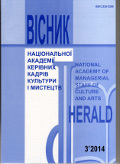МУЛЬТИКУЛЬТУРАЛІЗМ ЯК ОСНОВА МІЖОСОБИСТІСНОЇ КОМУНІКАЦІЇ У ПРОЦЕСАХ АКАДЕМІЧНОЇ МОБІЛЬНОСТІ
Multiculturalism as a fundament of interpersonal communication at academic mobility processes
Author(s): Denys SvyrydenkoSubject(s): Anthropology, Education, Communication studies, Sociology of Culture
Published by: Національна академія керівних кадрів культури і мистецтв
Keywords: academic mobility; global ethics; communication; multiculturalism; pedagogy; tolerance;
Summary/Abstract: The fundaments of fruitful communication at the academic mobility processes are analyzed at the paper. Author stands at position that multicultural tolerant thinking is a basic fundament for communication at alternative academic environment and modern pedagogical conditions have to be guided by multicultural principles. The question of searching of the global ethics values also analyzed at the article. We think that these values could promote multicultural dialog at academic environment as well as solve wide range of of problems at the modern polycultural society.Academic mobility is a complicated process of personal and professional development when person meets the need to solve own everyday situations analyzing them standing at positions of one’s own culture together with another one culture positions. At these situation person should wide range of own personal specific skills such as ability of multicultural communication; tolerant thinking without discrimination manifestations; self-reflection; existential openness etc. The member of academic society should realize the challenges one can face at alternative academic environment and should be ready for active adequate fit into the different lingual and cultural landscape.We understand ‘multiculturalism’ according to F.Brezzi as a term emerged in Canada at the end of the 1960s and described the ‘silent revolution’ of French Canadians, who form a minority in Canada but a majority in the province of Québec. One of their main objectives was the demand for state institutions to be bilingual, and for biculturalism in schools, which meant a separate curriculum for French-speakers differing from the curriculum for Anglo-Canadians. During the past twenty-five years multiculturalism has also been debated among philosophers and social scientists. In political philosophy the question arose in attempts to define the nature of a good liberal society (J.Rex, G.Singh).The historical and modern experiences prove that it is possible for different cultures to interact with agreement at interpersonal and group levels. It is principally possible to solve misunderstandings and give a common ground because of existence of universal examples of social interaction marked by different forms of behavior depending from cultural background: people at all the cultures greet one another, educate children, decide disputes doing it in different ways according to norms and usages formed historically.The planetary ethics is a main imperative of present days which is an ethics of Human as a whole directed on well-being of all the citizens of our planet. It is an attempt to substantiate common values, guiding rules, personal attitude and acts independently form culture, religion, ideology, political and economic systems.Concerning the educational problematic, P.Freire criticize monological type of education and underlines that it can’t form dialogic, plural, nonlinear type of thinking and we need categorical steps toward dialogical, subject-subject relations at education processes. New pedagogy require learners to became members of pluralistic global society throughout development of education programs aimed on individuals with understanding of own culture as well respecting another ones. The feature of correct thinking at education is a strong-willed negation of all the forms of discrimination (race, gender, class ones) which are the challenge for the essence of human entitle together with radical threat for democracy.Author underlines that there is a need to find new strategies of higher education area modernization coupled with globalization tendencies with their everyday growing value. Academic mobility is one of the leading instruments for developing of the higher education area and research one thus mobility implementation should take global, multicultural context into account. The academic mobility participants have to be ready for performing of fruitful intercultural communication based on the values of global ethics. The fundament of this ethics is tolerance, understanding and respect of Other, openness and flexibility of mind.
Journal: Вісник Національної академії керівних кадрів культури і мистецтв
- Issue Year: 2014
- Issue No: 3
- Page Range: 13-17
- Page Count: 5
- Language: Ukrainian

